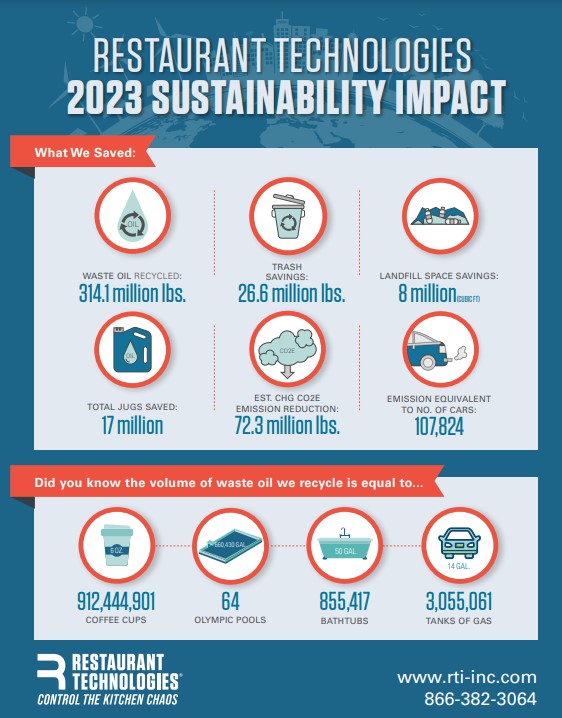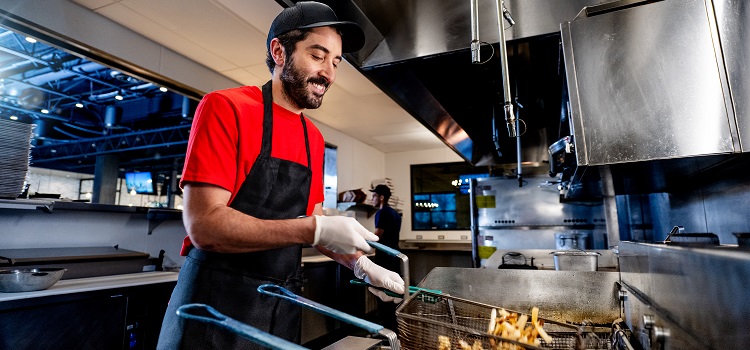In the foodservice industry, one often-overlooked hero in the battle against environmental degradation is cooking oil management and recycling. Whether at a large quickservice chain restaurant or a small mom-and-pop restaurant, well-managed cooking oil is key to a restaurant keeping up with not just taste and customer satisfaction, but also a smooth-running – and sustainable – business. From sourcing to storage and distribution to disposal or recycling, the way in which a foodservice operation manages its oil has the potential to have a significant impact on the environment.
Waste oil recycling for a greener tomorrow

Waste oil recycling can play a role in reducing landfill space, CO2 emissions and plastics usage. Restaurant Technologies, a Mendota Heights, Minn.-based provider of cooking-oil management and back-of-house hood and exhaust cleaning solutions, recycled 314.1 million pounds of waste oil in 2023.
Servicing more than 40,000 quick-service and full-service restaurant chains, independent restaurants, grocery delis, hotels, casinos, convenience stores, universities, and hospitals, the company also kept 26.6 million pounds of trash out of landfills, saving 8 million cubic feet of landfill space. By delivering cooking oil in bulk, Restaurant Technologies eliminates the plastic, cardboard and residual oil waste associated with traditional containers, saving 17 million jugs in 2023.
“We work with our customers, suppliers, and partners to reduce carbon emissions and waste and to recycle used cooking oil into biodiesel and renewable diesel,” says Jeffrey Kiesel, CEO, Restaurant Technologies.
The company’s Total Oil Management solution offers customers an end-to-end cooking solution, from delivery to collection and recycling of their used cooking oil into renewable diesel or biodiesel. Used cooking oil is transformed into feedstock oil through a meticulous process involving filtration, treatment with methanol and a catalyst, and glycerin production. The resulting biofuel, with its low carbon content, can be mixed with conventional diesel to create biodiesel, a more sustainable and eco-friendly fuel. Feedstock oil can also be converted into renewable diesel and sustainable aviation fuel, contributing to Restaurant Technologies’ impact on a national scale. In fact, Restaurant Technologies reduced CO2 emissions by an estimated 72.3 million pounds in 2023 and has established a comprehensive strategy to reduce its overall greenhouse gas emissions, guided by the Science Based Targets initiative.
“At Restaurant Technologies, our goal has always been to reduce the impact on humans and the environment by better managing cooking oil,” Kiesel explains. “As a company focused on sustainability, we are really excited to be able to ‘walk the walk’ by fueling our own commercial fleet with biofuel created from the used cooking oil we collect.”
Fueling sustainability from within
Beyond its partnerships with industry giants such as Chevron and Burger King, Restaurant Technologies’ sustainability efforts infiltrate its own operations and corporate headquarters. Initiatives like the Bridgestone tire replacement program and the adoption of fully biodegradable gloves, reusable water cups and ongoing efforts like solar panels, electric vehicle charging stations, scrap metal recycling and biodegradable shrink wrap highlight the company’s dedication to continuous improvement.
“We will continue to help more and more customers reduce their carbon footprint,” Kiesel says. “Not only do they want to have good food, but they want to do it in a way that’s going to be sustainable and have a positive impact on their local environment and the world in general.”
By reducing its own environmental impact and empowering its partners in the foodservice industry to do the same, Restaurant Technologies’ emphasis on waste oil recycling, sustainable sourcing and innovative partnerships positions it as a collaborative player in the foodservice world’s sustainability movement.
“We understand that our impact goes beyond the kitchen,” says Kiesel. “Our values — customer, character, commitment, courage, and community — guide us in every decision we make so that we may have the greatest positive impact possible. Even as Restaurant Technologies continues with double-digit growth, our business strategy and sustainability strategy are aligned.”
Related stories:
- Restaurant ordering in the age of voice AI
- How eatertainment restaurants are transforming dining
- Fried chicken is a vehicle for sharing culinary cultures
_____________________________________
If you liked this article, sign up to receive one of SmartBrief’s Food & Beverage newsletters. They are among SmartBrief’s more than 250 industry-focused newsletters.
